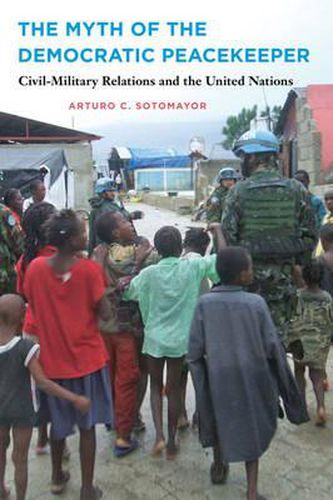Readings Newsletter
Become a Readings Member to make your shopping experience even easier.
Sign in or sign up for free!
You’re not far away from qualifying for FREE standard shipping within Australia
You’ve qualified for FREE standard shipping within Australia
The cart is loading…






If democratic principles do not just rub off onto United Nations peacekeepers, what positive or negative implications can be observed?
Winner of the Luciano Tomassini Latin American Relations Book Award of the Luciano Tomassini Latin American Relations
The Myth of the Democratic Peacekeeper reevaluates how United Nations peacekeeping missions reform (or fail to reform) their participating members. It investigates how such missions affect military organizations and civil-military relations as countries transition to a more democratic system.
Two-thirds of the UN’s peacekeepers come from developing nations, many of which are transitioning to democracy as well. The assumption is that these blue helmet peacekeepers learn not only to appreciate democratic principles through their mission work but also to develop an international outlook and new ideas about conflict prevention. Arturo C. Sotomayor debunks this myth, arguing that democratic practices don’t just rub off on UN peacekeepers. So what, if any, benefit accrues to these troops from emerging democracies?
In this richly detailed study of a decade’s worth of research (2001-2010) on Argentine, Brazilian, and Uruguayan peacekeeping participation, Sotomayor draws upon international socialization theory and civil-military relations to understand how peacekeeping efforts impact participating armed forces. He asks three questions: Does peacekeeping reform military organizations? Can peacekeeping socialize soldiers to become more liberalized and civilianized? Does peacekeeping improve defense and foreign policy integration?
His evaluation of the three countries’ involvement in the UN Stabilization Mission in Haiti reinforces his final analysis-that successful democratic transitions must include a military organization open to change and a civilian leadership that exercises its oversight responsibilities.
The Myth of the Democratic Peacekeeper contributes to international relations theory and to substantive issues in civil-military relations and comparative politics. It provides a novel argument about how peacekeeping works and further insight into how international factors affect domestic politics as well as how international institutions affect democratizing efforts.
$9.00 standard shipping within Australia
FREE standard shipping within Australia for orders over $100.00
Express & International shipping calculated at checkout
If democratic principles do not just rub off onto United Nations peacekeepers, what positive or negative implications can be observed?
Winner of the Luciano Tomassini Latin American Relations Book Award of the Luciano Tomassini Latin American Relations
The Myth of the Democratic Peacekeeper reevaluates how United Nations peacekeeping missions reform (or fail to reform) their participating members. It investigates how such missions affect military organizations and civil-military relations as countries transition to a more democratic system.
Two-thirds of the UN’s peacekeepers come from developing nations, many of which are transitioning to democracy as well. The assumption is that these blue helmet peacekeepers learn not only to appreciate democratic principles through their mission work but also to develop an international outlook and new ideas about conflict prevention. Arturo C. Sotomayor debunks this myth, arguing that democratic practices don’t just rub off on UN peacekeepers. So what, if any, benefit accrues to these troops from emerging democracies?
In this richly detailed study of a decade’s worth of research (2001-2010) on Argentine, Brazilian, and Uruguayan peacekeeping participation, Sotomayor draws upon international socialization theory and civil-military relations to understand how peacekeeping efforts impact participating armed forces. He asks three questions: Does peacekeeping reform military organizations? Can peacekeeping socialize soldiers to become more liberalized and civilianized? Does peacekeeping improve defense and foreign policy integration?
His evaluation of the three countries’ involvement in the UN Stabilization Mission in Haiti reinforces his final analysis-that successful democratic transitions must include a military organization open to change and a civilian leadership that exercises its oversight responsibilities.
The Myth of the Democratic Peacekeeper contributes to international relations theory and to substantive issues in civil-military relations and comparative politics. It provides a novel argument about how peacekeeping works and further insight into how international factors affect domestic politics as well as how international institutions affect democratizing efforts.